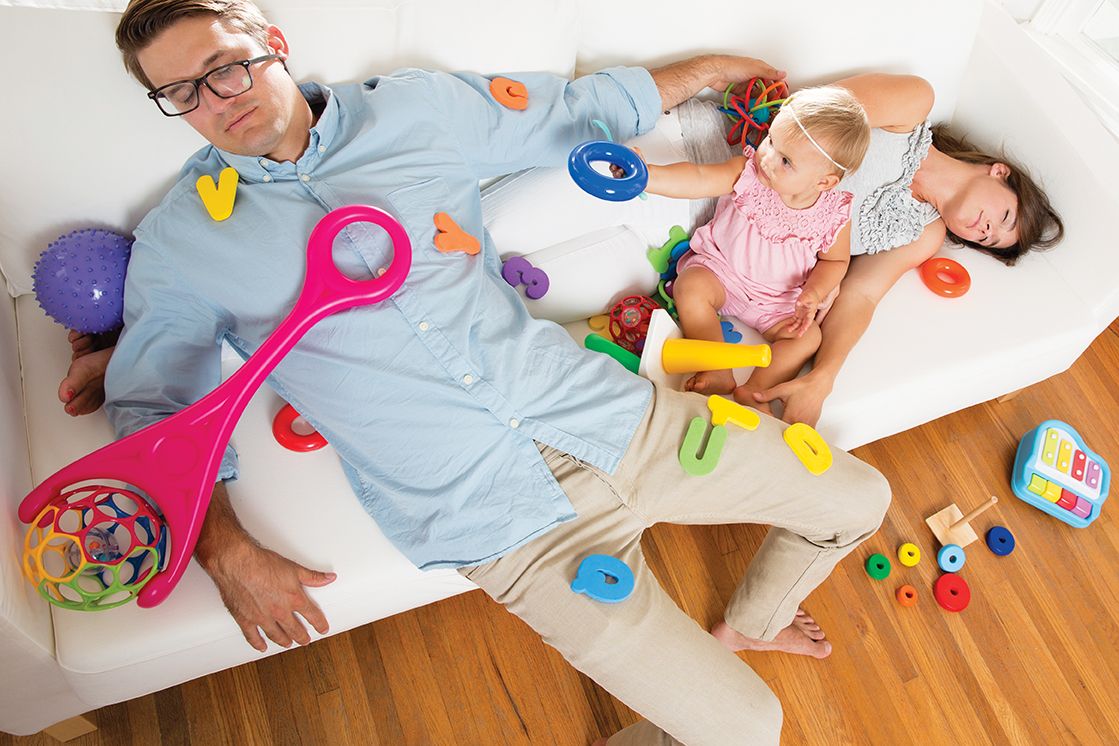You won’t believe how this book provides parenting insights for harried and frantic parents, desperate to raise their children right.
I hit the lowest point of my parenting journey after the birth of our second son. I was struggling to manage a sleepless newborn and an emotional toddler. I felt like I was adrift in a flimsy boat without an anchor, tossed about by the waves of parenting “shoulds” and “shouldn’ts”.
We live in a swirling sea of advice and information. We are desperately trying to keep up with the 10 Things Every Parent Must Know, the 12 Mistakes New Parents Make and the 17 Habits of Highly Happy Families. But we just end up feeling confused by conflicting advice, guilty about our imperfections and afraid of damaging our children.
According to Sue Palmer, author of Toxic Childhood, this is typical: “Most parents are frantically doing their best in a world where the goal posts are not just moving—they’ve actually disappeared. . . . In a world of tumultuous change, confidence is thin on the ground. The moral and social certainties [of previous generations] have disintegrated, and there seems to be nothing to put in their place.”
When I was desperate for guidance, I reached for the ancient wisdom of my ancestors—the Bible. I was sick of the internet’s fickle fads and craving the kind of unchanging, timeless wisdom that my grandmothers gave.
I came to the Bible looking for little pieces of advice, but I found something much better. The Bible showed me a grand vision—a “big picture”—that has put life and parenthood into perspective. Its message helped me to find the clarity, confidence and courage I needed to raise the next generation.
We were made for more than happiness
Our modern world is working hard to convince us that the goal of life is happiness. We are constantly told, “Do whatever makes you happy; follow your heart.” When you ask modern parents what we want for our children, we respond in unison: “We just want them to be happy!” And so we become anxiously dependent on our children’s emotions, doing everything we can to make sure they feel perpetually happy and successful.
But there is a problem: the more we chase happiness, the less we seem to find it. In the West, rates of depression and mental illness among both adults and children have never been higher. If life is just about feeling happy, then most of us are failing badly.
But the good news of the Bible is that we and our children were created for more than happiness. The Bible’s opening chapters show that humans were made in the image of our Maker for a bigger purpose. We were created to honour God by living well in His creation and doing good to other people.
It follows that parenting is not about making our children feel happy all the time, but about helping them to live out their God-given purpose, in relationship with God, His creation and other people.
Interestingly, recent research shows that simply chasing good feelings and running away from bad ones do not actually bring long-term satisfaction. Rather, the secret to a truly happy life is connection—finding our meaning in relationship to others, and to a bigger purpose in life.
Ironically, if we stop focusing on making our children feel good and start helping them to do good in line with their purpose, we will actually be giving them the best chance of finding genuine satisfaction in the long-run.
We don’t have to be perfect
If modern pop psychology has taught us anything, it’s that “It’s all your parents’ fault!” Naturally, when we become parents, we start to worry about what our children will be telling their psychologist in 20 years’ time. We are afraid that our mistakes and imperfections will “scar” our children for life.
Parents and children were made for the purpose of honouring God, living well in His creation and doing good to others. But there is a problem: we are human. The Bible is honest about our human limitations. It acknowledges that all of us—both adults and children—are born with a tendency not to live out our God-given purpose.
Sometimes I think parenthood has brought out the worst in me. The demands and decisions are so unrelenting that it feels impossible to stay calm and get it right all the time. One of my “bad mother” moments happened when our second son had just learnt to walk. He was tottering around our yard when his three-year-old brother came along and pushed him over. I was so angry and ashamed that my own son would do such a thing I raced after our eldest . . . and pushed him back! Parenthood seems to be littered with those kinds of moments when we do and say things we deeply regret.
The Bible describes the world we live in as “fallen” or imperfect. In this world, parents can never be perfect—we will have both a positive and negative impact on our children. It follows that human children aren’t perfect either. And here, in this fallen world, we cannot stop bad things from happening to our children. All of this can leave us feeling guilty and afraid.
But the good news of the Bible is that there is one perfect Parent: God. He invites us to stop being grown-ups for a moment and come to Him like little children. If we humbly confess our failings, God adopts us into His spiritual family. He forgives us through the death of His perfect Son, Jesus, and fills us with His strength to try again tomorrow.
We are not in control of our children’s world, but our Father is.
And He is working all things—both good and bad—for the good of His spiritual children.
When we reach the limits of our human capabilities, we can look up towards our Father in heaven and rest in His endless compassion and strength.
Experts are now urging modern parents to give up the damaging mindset of perfectionism and aim simply to be “good enough”. Our imperfections and mistakes can become opportunities to show our children how to navigate life in this imperfect world. We can show them how to say sorry, and how to get back up and keep trying our best.
We don’t have to read all those articles
In this age of information, it’s tempting to take our parenting dilemmas straight to “Dr Google” and start clicking on an endless trail of articles. But when we do this, it’s easy to become preoccupied by the tiny details of our children’s lives and forget about what really matters. At one point, I realised I had become more concerned about how many servings of vegetables the boys were eating than whether or not they were learning to be kind!
But the good news is that in the Bible, God has established a framework of timeless values that can help us to prioritise what truly matters when it comes to raising our children.
God’s values are easy to sum up. Jesus said that all of the laws and commandments in the Bible are expressions of love—love for God and love for other people. Loving God means acknowledging Him as our Creator and worshipping Him alone. Loving other people means committing ourselves to their good.
When our minds are spinning with too much parenting information, it helps to step back and remind ourselves of the key values that we want to shape our family.
Free printable! Developing your parenting values
We don’t have to do this alone
One of the major reasons that modern parenthood is so hard is that, for the first time in history, we are trying to do it alone. Many of us have moved away from our extended families and now feel isolated.
Besides the problem of distance, many of our parents are still working full-time and are not around to help during the week. Our relationships with our neighbours are also more transient and superficial than in previous generations. On a day-to-day basis, it can feel like it’s just us—mum, dad and the kids—battling against the world.
But the good news of the Bible is that we weren’t meant to do this alone. God has always called individuals to be part of a bigger community, bound together by a set of shared values. Jesus invited all people, whether young or old, married or single, to become children of God by faith. Those who do this join a new family that is characterised by love for God and other people.
As parents, it’s vital to have the support of this kind of community, especially if our own family are not nearby. We can benefit from having spiritual brothers and sisters, aunts and uncles, grandmothers and grandfathers, who can encourage and support us in the challenging task of raising our children to know and live out their God-given purpose on earth.
When I started reading the Bible as a desperate modern parent, the frantic story of our little family began to sink into the strong embrace of a much bigger story. I gradually found my confusion giving way to clarity; my guilt and fear, to freedom; and my uncertainty, to the courage and confidence that comes from knowing your place in God’s big picture. And that was good news indeed!

How helpful was this article?
Click on a star to rate it!
5 / 5. 2
Be the first to rate this post!
Harriet Connor
Related posts
Subscribe
Receive personalised articles from experts and wellness inspiration weekly!

